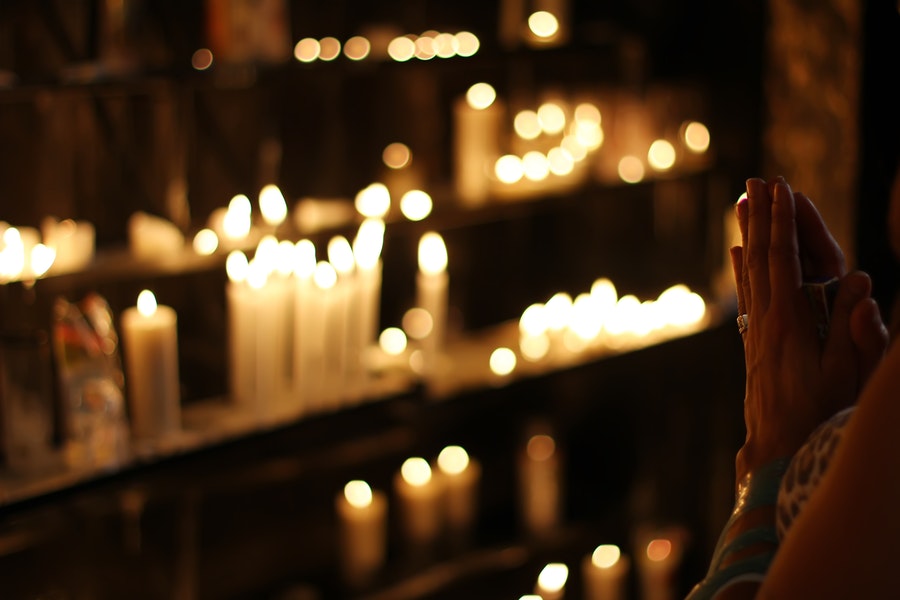Attach Your Emotions
Whenever something is wrong with me or I have something that I desire, my husband’s first question is, “Did you pray about it yet?”
It’s such an important question that leads me back to God before I start to worry or try to accomplish something on my own. Recently, my husband has been telling me to attach emotions to my prayers. And he is on to something because anytime I attach my emotions to my prayer, I tend to get exactly what I pray about. I realize that this is because God responds to our hearts, not just our words or our actions. God wants to know the intent behind our prayers and that we are praying with the belief that He is the answer to our prayers.
Emotionless Thoughts and Prayers
 Recently, I read on my news app about the mass shooting in Thousand Oaks in which one man shot twelve people. What I did next is appalling. After I read the story and thought about how awful and sad it was that this happened, I said a quick prayer for everyone involved, but then quickly scrolled to the next story.
Recently, I read on my news app about the mass shooting in Thousand Oaks in which one man shot twelve people. What I did next is appalling. After I read the story and thought about how awful and sad it was that this happened, I said a quick prayer for everyone involved, but then quickly scrolled to the next story.
I scrolled to the next story!
Do you get what’s wrong with this? I literally spent less than five minutes reading the full article and saying my brief prayer. The problem is that I did not attach any emotion (fervency) to my prayer at all. Yes, I was sad. Yes, I was upset. But, I did not take the time out to actually process what happened and to really think about what this tragedy means and how it affects so many people. I had become desensitized.
I read this story early in the morning before I went to work. I went through my whole day and it crossed my mind several times, but I just kept working as if nothing was wrong. I laughed and joked with my coworkers, I went to a training and even saw some clients as if everything was honkey-dorey. But, I couldn’t get this out of my head. So, I decided to see what Bible verses I could find on death because this mass shooting was weighing on me mentally.
A Time to Cry
 I came across Romans 12:15 (ESV) which says, “Rejoice with those who rejoice, weep with those who weep.” Why wasn’t I weeping? Why was I pretending everything was ok when it really wasn’t? God has called us to weep with those who weep, and there are hundreds of people affected by this tragedy who are all weeping. Yet, here I am going on with my day as if nothing has happened.
I came across Romans 12:15 (ESV) which says, “Rejoice with those who rejoice, weep with those who weep.” Why wasn’t I weeping? Why was I pretending everything was ok when it really wasn’t? God has called us to weep with those who weep, and there are hundreds of people affected by this tragedy who are all weeping. Yet, here I am going on with my day as if nothing has happened.
I started thinking, what if our lack of obedience is why we have had 307 mass shootings in the 311 days of 2018? What if God is telling us to be obedient and actually weep?
God doesn’t want us to comment “sending thoughts and prayers,” He wants us to think about the situation and sincerely pray for everyone affected. God doesn’t want us to send praying hand emojis, He wants us to fold our own hands and pray.
He wants us to attach emotions to our prayers regarding our nation and the rise of violence that has surged in recent years. But, to attach emotion to your prayers, you actually have to think about what happened and how the people closest to the situation are feeling.
Jesus is Touched by Us, He Feels Us
Once we really attach emotions to our prayers, God will grant them.
James 5:17-18 (NIV) gives this example, “Elijah was a human being, even as we are. He prayed earnestly that it would not rain, and it did not rain on the land for three and a half years. Again he prayed, and the heavens gave rain, and the earth produced it crops.”
This is the definition of earnest: serious in intention, purpose, or effort; sincerely zealous; showing depth and sincerity of feeling. Elijah, who was just a man like us, prayed with intention, purpose, and sincerity of feeling; meaning that he attached emotions to his prayer. God granted his prayer because of how earnest he prayed.
Jeremiah 17:10 (ESV) says, “I the LORD search the heart and test the mind, to give every man according to his ways, according to the fruit of his deeds.” God knew that Elijah was praying with the right intention and with a pure heart. Imagine what would happen if millions of Christians all over the world begin earnestly and fervently praying for the end of violent crimes (James 5:16).
So, What’s the Play Call?
Jesus made us a promise in John 14:13-14 (NIV) by saying, “And I will do whatever you ask in my name, so that the Father may be glorified in the Son. You may ask me for anything in my name, and I will do it.” Start attaching emotional fervancy to your prayers right now and make sincere requests for an end to violence to our Father in the name of Jesus. Also, “let us hold tightly without wavering to the hope we affirm, for God can be trusted to keep His promise” (Hebrews 10:23 NLT).
As soon as you are done reading this post, think about the crimes and calamity that we are experiencing as a nation. Start to think about how it affects people, and if it helps, think about how you would feel if one of your family members was involved. Once you get to the point that you are emotional, pray earnestly for our nation and the world. We can turn this nation around with our sincere, impassioned prayers.





Lately, my prayer life has been dry and mechanical . I go through these spells and become quite frustrated . A simple web search led me to this article and I am thankful for your insight and I will carry your practice into my prayerlife. God bless you in all things.
Thank you for your insight. I will try praying along these lines.